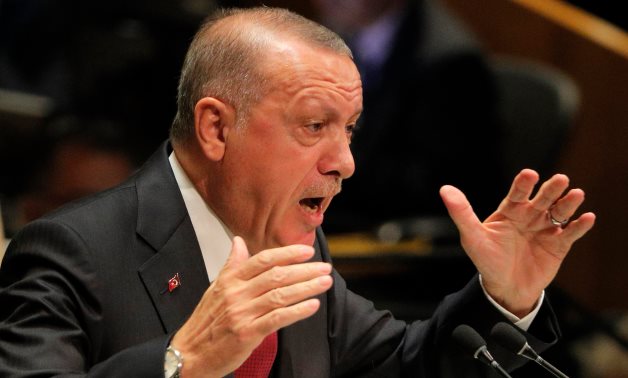
Turkey's President Recep Tayyip Erdogan addresses the 74th session of the United Nations General Assembly at UN headquarters in New York City, New York, Sept. 24, 2019. Photo by REUTERS/Brendan Mcdermid.
CAIRO – 26 July 2020: Turkey’s new regional foreign and security policy represents a strategic dilemma for NATO as well as an increasingly stark divide between the European Union and Ankara, a study by the Center for Strategic and International Studies said.
This strategic dilemma, according to the study. is rooted in Turkey’s new regional foreign and security policy, based in part on its “Blue Homeland” doctrine. The implementation of this doctrine has caused a series of serious incidents that have been observed by Turkey’s allies but fleetingly, if rarely, addressed.
"But the totality of Turkey’s policies and actions have now reached a point of dangerous escalation, which could substantially challenge the coherence of NATO’s collective defense posture in the Mediterranean and weaken its political cohesion. Turkey’s actions threaten to hinder vital NATO-EU cooperation in the region as well,” the
study said.
Turkey’s Blue Homeland Doctrine has its origins in a plan drawn up by Turkish admiral Cem Gurdeniz in 2006. It sets out an ambitious goal to underline and expand, through assertive diplomacy and military means.
According to the study, to date, Turkey has met little resistance from either the European Union, NATO, or the United States in response to its actions, with the exception of harsh words and limited sanctions.
Some EU parliamentarians have denounced Ankara’s “gunboat diplomacy,” and EU high representative Borrell released a declaration stating that EU countries are “growing increasingly concerned about the recent escalations from Turkey.”
EU foreign affairs ministers convened on July 13, asking Ankara to provide “clarifications” on its actions in the Eastern Mediterranean, Libya, and Syria and asking High Representative Borrell to provide options to reinforce the sanctions imposed on Turkey for its gas and oil drilling activities in Cyprus’ EEZ.
Moreover, Secretary of State Pompeo has called Turkey’s illegal drilling in Cypriot waters “unacceptable,” yet this is unlikely to be followed by concrete action given that the Trump administration has not yet imposed legally mandated sanctions on Turkey for its purchase of the Russian S-400 missile defense system.
The study further said that tensions between Turkey and France have escalated lately as both presidents have used very strong rhetoric against the other. Although it might be tempting to hope that tensions will fade, they are likely to escalate again and have major implications for the European Union, NATO, and the rule of law.

Comments
Leave a Comment